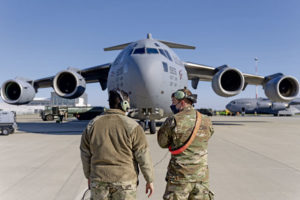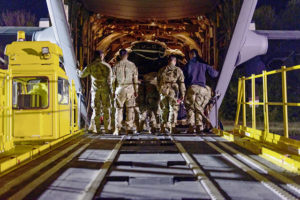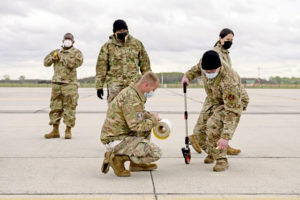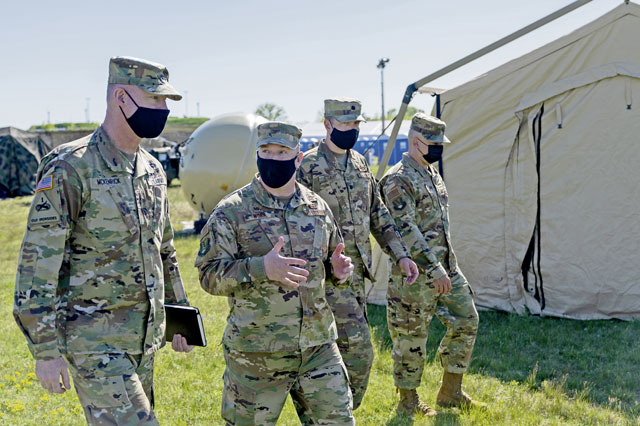
The 435th Contingency Response Group, assigned to the 435th Air Ground Operations Wing at Ramstein Air Base, showcased strategic readiness and interoperability during exercise Swift Response 21 at Pápa Air Base, Hungary, May 5-14.
The exercise highlighted agile combat employment initiatives through joint and combined training in a simulated contested environment.
“The 435th CRG is qualified in a full spectrum of mission sets, and during Swift Response we were able to demonstrate almost all of our capabilities,” said Maj. Dillon Deutsch, 435th Contingency Response Squadron assistant director of operations. “The Airmen of the 435th CRG operated an intermediate staging base, which required inspecting and loading cargo and passengers, providing maintenance to aircraft, executing command and control, providing airfield management, and everything else required to operate an air base.”
Swift Response 21 was one of several exercises associated with the annual large-scale U.S. Army-led, multinational, joint exercise DEFENDER-Europe. It included airborne operations in Estonia, Bulgaria and Romania involving more than 7,000 troops from 11 countries.
“The combined training with the Hungarian Defence Forces focused on the 435th CRG launching a large number of sorties from Pápa AB with the support of the host nation forces,” Deutsch said. “The joint training for the 435th CRG was the mission planning and execution of a contested airfield assessment and turnover with the 173rd Infantry Brigade Combat Team (Airborne).”
In support of the National Defense Strategy and NATO deterrence objectives, Swift Response 21 built strategic readiness by mobilizing and deploying forces, sustaining them in a crisis training environment and redeploying them when their mission was complete.

“The CRG is responsible for responding to humanitarian missions or crisis response,” said Senior Airman Chad A. Dethloff, 435th CRS aerospace ground equipment apprentice. “Whichever one it is, we have to be there anytime, anywhere. We’re all multi-capable Airmen, and everyone needs to know a little bit of something about someone else’s job.”
The large-scale movements of troops and equipment required extensive support from the host nation, and, as a NATO ally, Hungary maintained and sustained those deployed forces to improve military mobility and flexibility.
“The host nation supported several thousand U.S. Soldiers and Airmen executing the launch and recovery of dozens of aircraft and hundreds of thousands of pounds of cargo,” Deutsch said. “It was an absolute honor to be able to work with the professionals of the Hungarian air force on a daily basis, and the exercise not only enhanced our interoperability, but was also an opportunity to make personal friendships.”
The 435th CRG is dedicated to opening and operating airfields in austere environments, enabling the employment of airpower anywhere in the U.S. Air Forces Europe – Air Forces Africa area of responsibility. Its contingency response Airmen provide 24/7 alert capabilities through scalable, cross-functional and rapidly deployable forces.
“Contingency response Airmen are often the first U.S. Air Force boots on the ground in a contingency to open an air base and enable access for follow-on mission capability,” Deutsch said. “As the original multi-capable Airmen, our training pipeline begins with teaching skill sets across the spectrum of air base operations. All of our Airmen have the baseline training necessary to work across Air Force specialties in order to make the mission go.”

Swift Response 21 included the launch and recovery of multiple C-17 Globemaster III, C-130J Super Hercules and C-130H Hercules aircraft within a strict time frame, and demonstration of the contingency response capabilities necessary to perform initial airfield operations.
“We coordinated with the Army and the Hungarian forces to provide us with the equipment and resources we need to open up an air base,” Dethloff said. “We have more than 30 AFSCs that participate in setting up what we need. Everyone has a specific job, whether it is setting up power or the computers that go inside the tents. We all work as a team.”
Swift Response 21 and other associated DEFENDER-Europe 21 exercises enhance alliance security by maintaining NATO’s broad range of military capabilities to deter aggression and assure allies of NATO’s readiness to respond.
“Swift Response demonstrates the United States’ capability to deploy high readiness forces on a moment’s notice,” Deutsch said. “The large presence and commitment of forces demonstrates the United States’ commitment to our NATO allies, as well as our resolve to deter potential adversaries. The Airmen performed beyond expectations, and this greatly enhanced not only mission success, but also aided the hugely impressive interoperability with both the Army and partner nations.”



